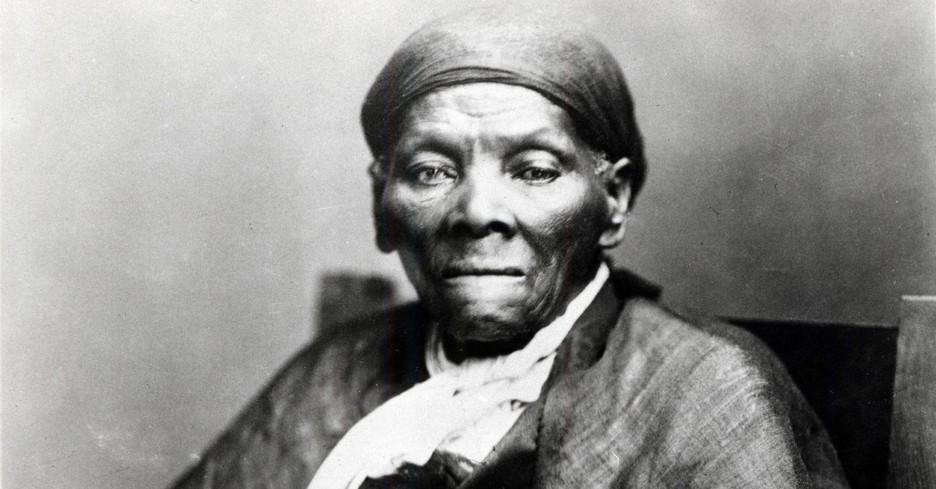
Born: a slave in 1820 -- Dorchester County, Maryland
Died: 1913 -- a free woman in Auburn, New York
"Harriet, I can't go no farther," my brother moaned as we ran through the darkened woods. "Just let me go back. I'll take the whipping and promise never to run away again."
I understood his fear. I'd seen it before and had even felt it when I first ran away from the plantation. "The good Lord will see us through, Jim," I reminded him. But poor Jim was so sure we'd be caught that he tried to turn back.
I reached into my pocket and pulled out the shiny silver pistol I used when encouraging words weren't enough. "You gonna live free in the north or die right now in the south," I warned. I didn't like doing this, but there were too many people risking their lives for his freedom. Without another word, Jim turned and began walking north. I knew he'd thank me as all the others did once he tasted freedom.
My First Job
Many years earlier, I was playing in the yard when Master Brodas called me to the big house. He was standing on the porch with a white woman who asked how old I was. Master Brodas told me to open my mouth. Seeing that my front teeth were missing, he guessed. "Five or six years old. As I told you," he continued, "she ain't house-trained, but you get what you pay for."
"I guess she will do," the woman said. She signed some papers and motioned for me to get on the wagon. My mind began to race. Where was she taking me? I had heard the grown folk whispering about how slaves were taken farther south, never to be heard from again. I wanted to jump off the wagon and run to the field where my father was working, but I knew I would be caught and beaten. At just six years old, I was being hired out to make money for the plantation.
No matter how hard I tried, I could not do as good a job as was expected. I was beaten and spat on. Once I ran away and hid, living with the pigs for two days, sneaking their food to survive. After being returned to the plantation, beaten and bruised, my momma warned me, "Child, now that you at hiring age, you better do a good job or they'll sell you south." Being sold south struck fear in every slave's heart. Fortunately, my mother also told me I could call upon the Lord for help at any hour of the day or night. I would remember that during the many difficult times to come.
The Brain Injury
When I was only 13 years old, a friend warned me he was going to make a run for freedom. As the overseer tried to catch him, I jumped in the way to help my friend escape. The overseer threw a two-pound weight at him, but it hit me instead. I spent the next week unconscious on the floor of our cabin. It was many months before I could sit up or walk again. The weight left a permanent, two-inch gash in my head. For the rest of my life, the injury made me black out when I least expected it. All the pain and suffering was worth it to help a fellow slave taste freedom.
My Escape
I was working at the far end of the field one day when a Quaker woman slowed her buggy and told me if I ever needed help, she would be a true friend. Years later, after Master Brodas died, I felt God telling me it was time to go. I'd heard a rumor that I was going to be sold the next day. That night I slipped out into the darkness and began to run. I found my way to the Quaker woman's house.
"I'm Harriet Tubman," I told her. "You told me I could come to you if I needed help."
"Thee was right to come," the Quaker woman said. She explained to me that the Underground Railroad was not a railroad with trains but a group of friendly folks who were willing to help runaway slaves reach the free north. Telling only my sister, I left immediately, running through the woods. Following the North Star, I crossed through streams and lakes to throw the barking bloodhounds off my scent. At each safe house I was given a hearty meal and a bed to sleep in. My last stop was at the home of a shoemaker, who hid me in a secret room for two days. Early on Sunday morning, the sixth day after I had left the Brodas plantation, the shoemaker gave me clean clothes, a black veil to cover my face, and a new pair of shoes. He took me by carriage close to the Delaware-Pennsylvania border. He pressed a silver dollar into my hand and gave me a piece of paper with the word "Pennsylvania" written on it. "Thank you sir, and may God bless you for all your help to me," I said and began my final two miles to freedom.
As I got near the signpost for Pennsylvania, I took out the piece of paper and held it up to the sign. The words matched! I was now breathing free air. No one would ever be able to whip or sell me again. I vowed never to return to the south. But as time passed, I began to feel very lonely for my family. I wanted them to be free too. I worked very hard and saved money so I could go back and help anyone who wanted to escape.
postscript
Harriet Tubman was called the Moses of her people. She made 19 trips back to Maryland, leading more than 300 slaves to freedom, including her family. A $40,000 reward was issued for her capture, dead or alive. She narrowly escaped capture many times, but credited God for rescuing her from her trouble and directing her daily.
Make It Real! Questions to make you dig a little deeper and think a little harder.
1. Harriet was thrilled when she was finally breathing the free air of Pennsylvania. Yet she willingly risked both her freedom and her life so that others could be free from slavery. What do you think motivated her to take such risks?
2. Does it surprise you that for the sake of one slave's freedom, many people need to risk their lives? How was their opinion of slavery different from the opinion of the slave owners? Why do you think they were willing to take such risks?
3. Harriet was known as the "Moses of her people." What parts of her story remind you of Moses?
Suggested reading:
Harriet Tubman: Freedombound by Janet & Geoff Benge (Heroes of History series, Emerald Books)
Listen for the Whippoorwill by Dave & Neta Jackson (Trailblazer Books, Bethany House)
Further Reading:
What Can Christians Learn from Martin Luther King Jr?
How Did Howard Thurman Change the Civil Rights Movement?
Samuel Morris, Missionary to America
Rosa Parks and the Bus Ride That Changed America
Phillis Wheatley: A Slave No More
George Washington Carver: Perseverance and Resourcefulness
("Harriet Tubman: Freedom or Death" published on Christianity.com on July 16, 2010)
Photo Credit: © Getty Images/Photos.com

.png)
